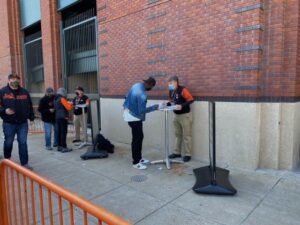Laura Kidd Plummer, a grandmother of nine, living on $1500 a month, was one of the residents of Stockton, California who struggled to make ends meet. She juggled a plethora of bills and barely had enough money for food. She had to deny herself the great joy of being able to host family dinners.
But, recently Plummer has been able to experience several “nice dinners” without the embarrassment of asking her children to contribute money to pay for them. She is one of the 125 residents of Stockton to receive a guaranteed income of $500 a month as a participant in the Stockton Economic Empowerment Demonstration (SEED). In an interview with NBC News, Plummer says having this guaranteed income is “like being able to breathe.”
The SEED guaranteed income experiment to support the members of a community is a capstone project in supporting the city of Stockton’s renewed health and viability. In 2012, Stockton had declared bankruptcy, brought about by years of mismanagement stemming from overspending on catchpenny developments downtown. Stockton’s fiscal problems were exacerbated by the subprime crisis and the Great Recession of 2008. Stockton’s emergence from bankruptcy in 2015 was overseen by the United States Bankruptcy Court.
In 2016, the light at the end of the tunnel was realized when Michael Tubbs was elected mayor, becoming one of the youngest mayors in the nation and the first Black mayor of Stockton. Tubbs was instrumental in creating and leading SEED and elevating Stockton from the pits of bankruptcy to one of the healthiest cities economically in California.

Photo courtesy of Wikimedia Commons
SEED was a pilot program for guaranteed income funded by private money that launched in February 2019 and ended two years later. The program gave 125 randomly selected residents who lived in economically disadvantaged neighborhoods $500 a month, no strings attached. “Poverty is the biggest issue,” Tubbs said, describing his motivation behind the guaranteed income program. “Everything we deal with stems from that. There are so many people working incredibly hard, and if life happens, there’s no bottom.”
SEED found that recipients spent a monthly average of 35% of their SEED money on food, but the impact of the guaranteed income extends beyond the dinner table. The income improves the mental well-being of its participants by making life less stressful, permitting risk-tasking (such as starting a new business or quitting a bad job) and creating greater freedom and agency.
The general idea of a universal basic income (UBI) — that the government should provide an economic floor by giving every citizen some amount of money (typically ranging from $500 to $2000) with some degree of regularity (usually a month, or year) — has been around since the 16th century. Past advocates include such historical figures as Thomas Paine, Martin Luther King Jr. and libertarian economist Milton Friedman.
Direct cash payments like SEED have been commonly used around the world as a straightforward and highly effective way of alleviating poverty. But not in the United States. According to the Organization for Economic Cooperation and Development (OECD), the U.S. spends an extraordinarily small percentage (0.6%) of its GDP on public family cash transfers.
America’s history with welfare, especially cash welfare, is rocky. Almost twenty-five years ago, President Bill Clinton signed a welfare reform bill that established an ambitious program, Temporary Assistance for Needy Families (TANF). The vision behind TANF was to boost citizens to self-sufficiency through work requirements and restrictions.
Today, welfare offered to the needy across the country is a shadow of its former self — at best, TANF spends less than one-fifth of its budget on direct cash payments and its dollar amount has not increased since 1996. Programs to support the needy have either fallen into inadequacy or disappeared in certain parts of the West and much of the South.
In the aftermath of welfare reform, millions of Americans like Plummer are on the edge of falling through the cracks — 63% of Americans are living paycheck to paycheck, while nearly three in four workers say they live in debt, according to Forbes. There has also been a sharp rise in the number of households with children reporting incomes of less than $2 per day, according to the National Bureau of Economic Research. Advocates for UBI argue that direct cash transfers are a policy that would assist in remedying economic pressures and issues that the U.S. welfare system has failed to address.
The COVID-19 pandemic has given the idea of basic income fresh momentum. With mass unemployment, financial loss, a flood of evictions and a federal government willing to spend big, some are arguing that citizens need some kind of basic income.
Lately, the popularity for basic income has surged as a result of a number of things including Andrew Yang’s presidential campaign, the economic vulnerability of the average American as unveiled by the pandemic and the bipartisan distribution of stimulus checks by Presidents Donald Trump and Joe Biden.

Photo courtesy of Basic Income March
The Stanford Basic Income Lab, founded in early 2017, is led by Professor Juliana Biddanaure. Biddanaure’s team is dedicated to researching dissemination, organizing workshops for undergraduates and informing officials and politicians about UBI.
Olga Lenczewska, a graduate fellow at the Stanford Basic Income Lab, in an interview for this article, highlighted the need for a basic income program amidst the background of the federal government budgeting only 8% ($361 billion) for safety-net programs in 2019, according to the Center on Budget and Policy Priorities. “It is easy to miss some of the people in need of cash and support for achieving an economic basic security and living a decent life,” said Lenczewska.
Not only are these programs not distributing money to everyone in need, but as Lenczewska put it, “There is a big stigma with receiving welfare benefits…some people don’t claim their benefits because of it.” However, Lenczewska believes UBI solves this issue because of its no strings attached nature, meaning that “you wouldn’t have to disclose that information.”
Lenczewska underscored how UBI can tackle more than just poverty, arguing that it can improve gender justice in the household by changing what work is from a “fetishization of participating within the labor market,” to looking at “domestic work which can often be more challenging, because of irregular hours and personal aspects of it.” Lenczewska explained the context behind why domestic work is not often considered “real work,” stating that it is because “it is not seen,” “there is no employer” and “it is done by mostly women, who historically have had not as much political power and visibility.”
SEED recipient Chelsea, who is a single mother of two, spends her $500 on daycare for her kids and wonders if she had recieved SEED benefits when she was in abusive marriage if things would be different. “I stayed in a bad marriage for longer than I should have because I didn’t have the funds or the means to leave,” she said.
In the middle of a politically divisive time, Lenczewska believes that such a radical policy “has a big potential to be politically feasible” because it speaks to many sides of the American political sphere. She described how it might appease to libertarians, as it “makes the role of government more minimal, efficient and does not impede on freedoms,” and why those on the left might endorse it too, as it is also “more likely to put people on equal footing and elevate those who are needy and poor higher up.”
Although basic income presents a multitude of benefits, it is not all sunshine and flowers — at least according to Nobel award-winning economist Paul Krugman. “The trouble with [basic income] is either it’s going to cost an amount that’s beyond what is politically possible in the next couple decades, or it’s going to be way inadequate,” he said in an interview with CNBC. Krugman’s concerns around the viability of basic income join those of conservatives who describe themselves as advocates of “fiscal responsibility” or progressives that want to prioritize an expansion of Social Security or the establishment of new, more targeted programs.
The data is clear that UBI has a beneficial impact on recipients like a person identified as Real Madrid, a middle-aged immigrant who is the caregiver for his disabled father and sister and was living off his sister’s food stamps, his student loans and his father’s Supplemental Security Income. Getting the $500 monthly permitted Madrid to focus on “having a decent job” and continuing his associate degree in business. That money made all the difference.







